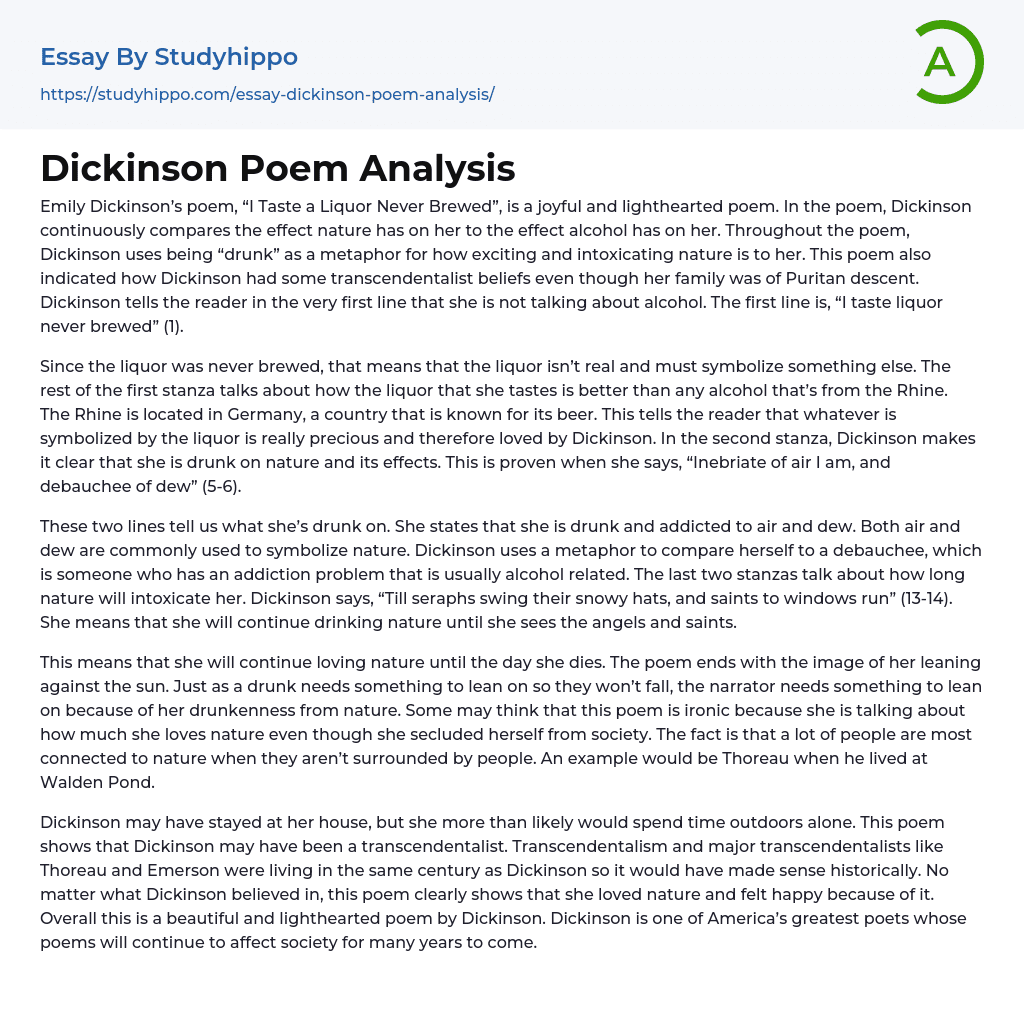Emily Dickinson’s poem, “I Taste a Liquor Never Brewed”, is a joyful and lighthearted poem. In the poem, Dickinson continuously compares the effect nature has on her to the effect alcohol has on her. Throughout the poem, Dickinson uses being “drunk” as a metaphor for how exciting and intoxicating nature is to her. This poem also indicated how Dickinson had some transcendentalist beliefs even though her family was of Puritan descent. Dickinson tells the reader in the very first line that she is not talking about alcohol. The first line is, “I taste liquor never brewed” (1).
Since the liquor was never brewed, that means that the liquor isn’t real and must symbolize something else. The rest of the first stanza talks about how the liquor that she ta
...stes is better than any alcohol that’s from the Rhine. The Rhine is located in Germany, a country that is known for its beer. This tells the reader that whatever is symbolized by the liquor is really precious and therefore loved by Dickinson. In the second stanza, Dickinson makes it clear that she is drunk on nature and its effects. This is proven when she says, “Inebriate of air I am, and debauchee of dew” (5-6).
These two lines tell us what she’s drunk on. She states that she is drunk and addicted to air and dew. Both air and dew are commonly used to symbolize nature. Dickinson uses a metaphor to compare herself to a debauchee, which is someone who has an addiction problem that is usually alcohol related. The last two stanzas talk about how long nature will intoxicate her. Dickinso
says, “Till seraphs swing their snowy hats, and saints to windows run” (13-14). She means that she will continue drinking nature until she sees the angels and saints.
This means that she will continue loving nature until the day she dies. The poem ends with the image of her leaning against the sun. Just as a drunk needs something to lean on so they won’t fall, the narrator needs something to lean on because of her drunkenness from nature. Some may think that this poem is ironic because she is talking about how much she loves nature even though she secluded herself from society. The fact is that a lot of people are most connected to nature when they aren’t surrounded by people. An example would be Thoreau when he lived at Walden Pond.
Dickinson may have stayed at her house, but she more than likely would spend time outdoors alone. This poem shows that Dickinson may have been a transcendentalist. Transcendentalism and major transcendentalists like Thoreau and Emerson were living in the same century as Dickinson so it would have made sense historically. No matter what Dickinson believed in, this poem clearly shows that she loved nature and felt happy because of it. Overall this is a beautiful and lighthearted poem by Dickinson. Dickinson is one of America’s greatest poets whose poems will continue to affect society for many years to come.
- Canterbury Tales essays
- Dulce Et Decorum Est essays
- My Last Duchess essays
- Beowulf essays
- Sir Gawain And The Green Knight essays
- The Road essays
- Aeneid essays
- Odyssey essays
- Blackberry Picking essays
- Beowulf Epic Hero essays
- Aldous Huxley essays
- Alice Walker essays
- Amy tan essays
- Anne Bradstreet essays
- Anton Chekhov essays
- Arthur Miller essays
- Augustine essays
- Bertolt Brecht essays
- Booker T Washington essays
- Carol ann duffy essays
- Charles Dickens essays
- Charlotte Perkins Gilman essays
- Chinua Achebe essays
- Christina Rossetti essays
- Consider The Lobster essays
- Edgar Allan Poe essays
- Elizabeth Bishop essays
- Emily Dickinson essays
- Ernest Hemingway essays
- F. Scott Fitzgerald essays
- George Orwell essays
- Harper Lee essays
- Homer essays
- James Baldwin essays
- Jane Austen essays
- John Donne essays
- John Steinbeck essays
- Kate Chopin essays
- Kurt Vonnegut essays
- Langston Hughes essays
- Leonardo Da Vinci essays
- Mark Twain essays
- Mary Shelley essays
- Maya Angelou essays
- Nathaniel Hawthorne essays
- Oscar Wilde essays
- Percy Bysshe Shelley essays
- Peter Skrzynecki essays
- Phillis Wheatley essays
- Poets essays




